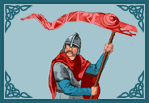 |
 |
|||
|
|
Riothamus or Riatham, as he was more simply known in Brittany, is remembered as one of the greatest of Breton leaders. Riomathus means Greatest-King. Some historians, notably Geoffrey Ashe, believe he was the character who inspired the tales of King Arthur's Continental campaigns. He appears quite clearly in the pedigrees of the kings of Domnonée recorded in several Breton saints' lives and chronicles. He is there recorded as a son of King Deroch II, although external evidence would suggest he was a son of King Deroch I and that Deroch II was his son. In the pedigrees therefore, Riatham seems to have been accidentally transposed with King Riwal who is there given as his grandfather. Riothamus is an historical character well attested in surviving records. A letter from Sidonius Apollinaris, a Roman prefect and Bishop of Clermont, written around AD 470, asks Riothamus for justice for "an obscure and humble person," who has had his slaves enticed away, by a group of armed Bretons, for whom the slave-owner was little match. He had appealed to the Bishop who, obviously thought Riothamus a fair-minded enough judge to reprimand his own people. He is also mentioned in Jordane's 6th century Gothic History. This records how the Roman Emperor Anthemius requested help from the Bretons in fighting the invading Visigoths. Riothamus responded with 12,000 armed men to the aid Roman cause. However, the Roman forces let him down completely and arrived at the ensuing battle too late to prevent the total annihilation of the Breton army at the hands King Euric of the Visigoths. Records of Riothamus date back to the 5th century. He is an historic personage.
|
|||
| © Nash Ford Publishing 2001. All Rights Reserved. | ||||




